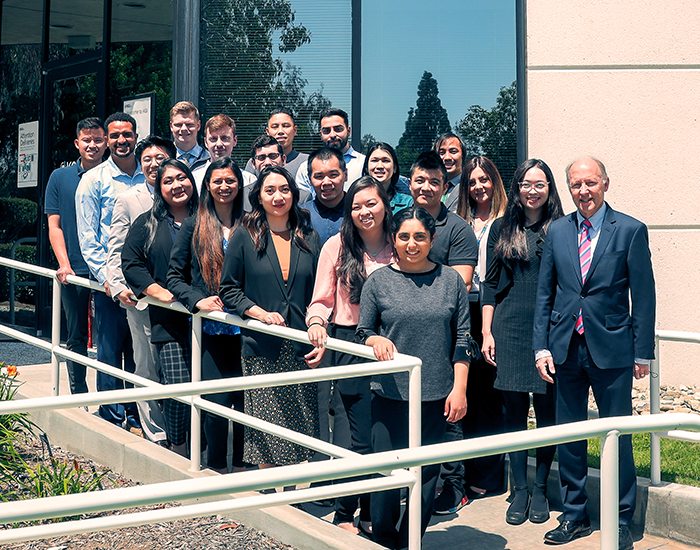A team of Keck Graduate Institute Doctor of Pharmacy (PharmD) students was recently announced as first-place winners of the Industry Pharmacists Organization (IPhO) Value of Industry Pharmacists (VIP) Case Competition. The competition allows students to creatively showcase their skills in all aspects of the pharmaceutical industry, from drug development to commercialization.
“This is an amazing feat, as we competed against more than 65 chapters across the United States,” said Razina Pathan, PharmD ’23 and Regional Student Officer of National IPhO, who served as Director of the competition. “This is the second time KGI has won, which is also very notable, as no other school has accomplished this.”
Many pharmacy schools participating in the competition were much larger than KGI.
“Part of that success can be attributed to the origins of our school, which has always been very industry-focused, even before there was a pharmacy school,” said team advisor Bernard Tyrrell, KGI associate dean for pharmacy and industry relations and professor of practice for administrative sciences.
For the competition, participants conducted a drug development project—in this case, a hypothetical treatment for Alzheimer’s Disease—from the beginning, production phase to the final stage of marketing the drug. Midway through the competition, students were presented with a Challenge Point—a drug development obstacle in a unique scenario—and used innovative thinking to overcome the challenge.
For the final stage of the competition, the team submitted a presentation to the judges (a panel of industry professionals) on their drug development plan, incorporating their solutions to the Challenge Point into the presentation.
As Director, Pathan oversaw all 26 KGI PharmD students who participated in the competition. The students were divided into teams, each addressing a different functional area: Clinical Development, Medical Affairs, Regulatory Affairs, and Marketing.
Each functional team had a leader: Bailey Tang, PharmD ’24, for Clinical Development; Nicole Kuriki, PharmD ’23, for Medical Affairs; Kenneth Teo, PharmD ’23, and Long Nguyen, PharmD ’23, for Regulatory Affairs; and Arlin Vartanian, PharmD ’23, and Jemal Hussein, PharmD ’23, for Marketing.
Additionally, the teams were divided into management subgroups, ensuring that all tasks were completed.
“The competition highlights the importance of pharmacists and the value that we can provide in industry and pharma companies,” said Catherine Ho, PharmD ’23 and President of KGI IPhO. “It shows how our involvement in certain functional areas can really benefit the process of bringing a drug to market.”
Coordinating all 26 participants—consisting of first to third-year students—was challenging for the leaders. Still, they navigated this challenge by holding regular meetings to ensure everyone was on the same page.
“At each meeting, we had action items, which helped keep everyone accountable,” Ho said. “Each time someone had an idea, we incorporated it into the project. Everyone had a role.”
Another factor contributing to the team’s success is that KGI offers certificate programs in specific functional areas such as medical and clinical affairs.
“We were then able to utilize what we learned and apply it to the competition,” Ho said. “We want to credit the school’s certificate program.”
Additionally, KGI offers courses in these functional areas.
“Right now, we’re taking a clinical development course, and before that, we had a medical affairs and marketing course,” Pathan said.
“All of these courses provided us with the knowledge and resources to create this drug development plan.”
Some students have been involved in the annual competition for multiple years.
“We’re thankful for the teams we’ve been a part of over the past years because we can learn from them and apply what we’ve learned,” Ho said.
Though Tyrrell served as an advisor, he credits the students for demonstrating initiative and independence throughout the project.
“This was a victory both in the understanding and articulation of drug development and the leadership and coordination of the students involved in the VIP competition,” Tyrrell said. “With our students’ busy lives, including school, work, and activities, coordinating 26 students to accomplish a large external project like the VIP competition is a challenge, especially among fellow students. Razina and the other team leaders had to get their fellow students together, work on the project, and meet deadlines, to make everything happen. To me, it’s a testament to their ability to self-manage.”
